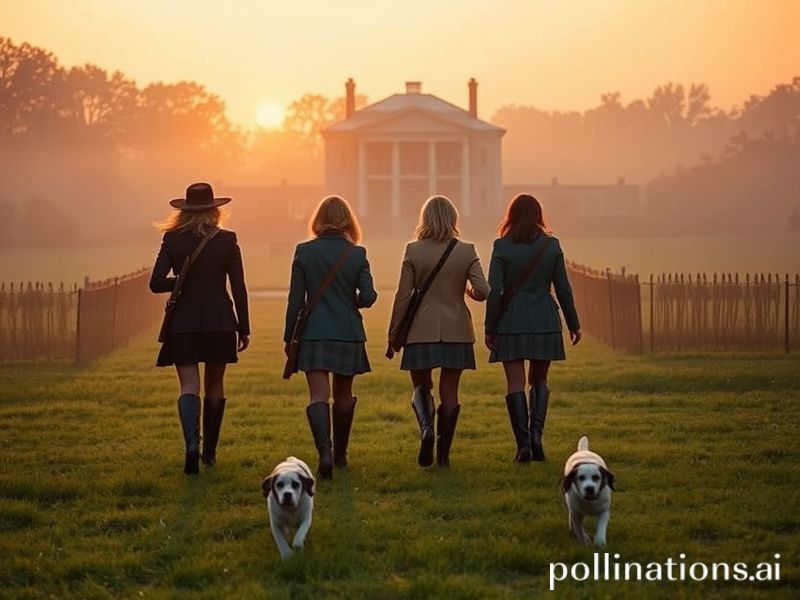Crossbows & Cabernet: How Hunting Wives Season 2 Became the World’s Favorite Guilty Terror
Silence of the Lambs-Wool Cardigans: Hunting Wives Season 2 Arrives to Terrify the Global Subconscious
Dripping onto screens like a Chardonnay spill on cream carpet, “Hunting Wives” Season 2 has become the international sleeper hit nobody’s embassy admits to binge-watching. Across four continents, diplomats’ spouses, arms-dealers’ girlfriends, and NGO directors alike are scheduling “late conference calls” to main- line the latest Texan gore-porn about affluent women who swap book clubs for crossbows. The show’s genius lies in convincing viewers that murder is simply another boutique hobby—somewhere between goat-yoga and crypto—thereby confirming every cynical stereotype the rest of the world quietly nurses about Americans with disposable income and unresolved lacrosse trauma.
From a geopolitical standpoint, the series is less entertainment than a soft-power psy-op. While Washington haggles over tariffs and Beijing fortifies sandcastles in the South China Sea, “Hunting Wives” does the real diplomatic heavy lifting: exporting the notion that U.S. suburbia is a glitter-dusted abattoir where Pilates instructors double as contract killers. Foreign ministries have taken note. In Paris, the Quai d’Orsay circulated an internal memo warning attachés not to joke about “second-amendment scrapbooking” at receptions; in Tokyo, the foreign press club ran a subtitled marathon, delighting journalists who finally had a metaphor for Japanese politics—minus the apology bows.
The show’s global reach is measurable in memes. A Brazilian deep-fake swaps the cast for Rio’s militia queens; Lagos Twitter overlays the theme song on dash-cam footage of VIP convoys mowing down traffic. Even war-torn Khartown managed a parody: militiamen reenact the infamous nail-gun baby-shower scene using actual nails, proving satire expires faster than ceasefires. Meanwhile, European wellness influencers—those industrious sprites who turned oat milk into a personality—now market “tactical athleisure” lines in desert-taupe, complete with Kevlar-lined yoga mats. Nothing says inner peace like pockets rated for 9mm magazines.
Streaming data reveal darker curiosities. VPN spikes in Moscow coincide with every new episode; analysts theorize oligarch wives are studying advanced trophy preservation techniques for enemies who inconveniently remain alive. In Riyadh, viewership reportedly doubles during Ramadan—after iftar, naturally—prompting clerics to issue fatwas against “weaponized gossip.” The irony, of course, is that the clerics themselves are seasoned practitioners; they simply dislike the competition.
Economists, ever the buzzkills, point to a measurable uptick in luxury-hunting gear exports from the American South. Italian leatherworkers now stitch monogrammed quivers; Swiss watchmakers release limited-edition chronographs with built-in ballistic calculators. One Geneva banker joked—off the record, between sips of contraband Cuban rum—that the show has done more for transatlantic trade than any summit since Bretton Woods. He then asked if I needed a discrete line of credit for “recreational cross-border litigation.” I declined; some hunts charge interest in femurs.
Human-rights observers, bless their laminated badges, fret over copycat incidents. A gated community in Cape Town allegedly hosted a “Foxcatcher Brunch” where residents tranquilized the landscaper for sport; he escaped by feigning gluten intolerance, a defense so bourgeois it may qualify for Geneva Convention protection. Still, the panic feels overblown. History suggests humanity needs little encouragement to weaponize privilege; the show merely adds a soundtrack.
Critically, Season 2 sharpens its satire until it draws blood. The writers—holed up in an Austin bungalow fortified by irony and Topo Chico—skewer performative feminism alongside performative marksmanship. One episode features a UN Women fundraiser where the centerpiece is a piñata shaped like the gender pay gap; the ladies take turns blasting it with pink AR-15s, showering the crowd in shredded grant proposals. Viewers in developing nations recognize the gag: empowerment, like champagne, is sweetest when someone else foots the corkage.
As credits roll on the finale—a slow-motion tableau of blood-spattered Hermès—global audiences are left with the queasy realization that the horror isn’t Texan, it’s planetary. Give any demographic enough money, boredom, and social-media validation and they’ll eventually hunt something. If Season 3 ventures abroad, may I suggest Davos? The ski slopes could use fresh red.







